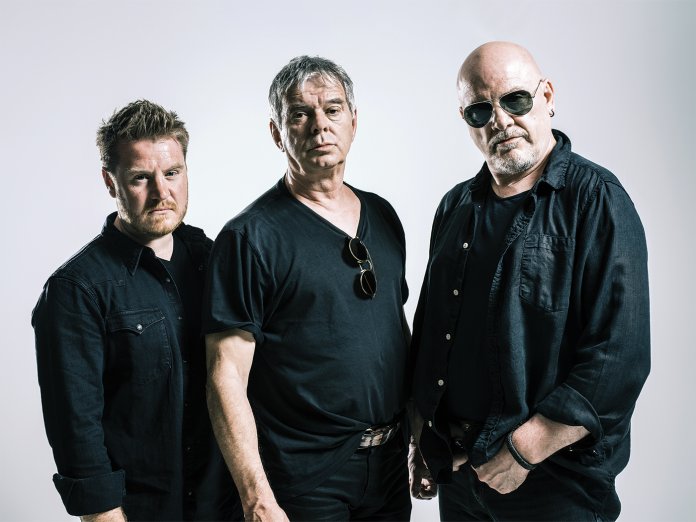Even punk didn’t want The Stranglers: the movement for damaged outcasts drew the line at these Surrey brutes, seen as too thuggish, ancient, sexist and straight. Before that, pub-rockers too thought themselves above this glowering crew, with their corduroy-wearing biochemistry graduate singer, 37-year-old jazz drummer with a taste for home-brewing, a brooding bassist ever itching to use his karate skills, and a hippie keyboardist whose unfashionable solos inspired flashbacks of the verboten Doors, though he expressed a preference for Yes. Such faces certainly didn’t fit Malcolm McLaren’s Situationist programme, leaving them as uncomprehending rock press pariahs, blindly lashing out at
their tormentors.
This violence climaxed when bassist and karate master JJ Burnel punched main singer-songwriter Hugh Cornwell through a wall in 1990, hastening his swift exit from the band. Today’s Stranglers are the result of a long and dogged climb back, after Burnel fought through his own gloomy indifference to reassert control over the drifting group, Baz Warne, guitarist since 2000, became bullish co-singer too, and Norfolk Coast (2004), their fifth album since entering the post-Cornwell doldrums, showed intent finally worthy of their past, combining rumbling attack, a ruggedly English sensibility and a measure of introspection.
And yet the blows keep coming. Their once terrifying drummer and founder, Jet Black, retired in 2015 with enough health problems to give Python’s Black Knight pause. Like Don Corleone near The Godfather’s end, he no longer runs things, but still offers wise counsel. So when Dave Greenfield, their jazzy, proggy keyboardist, died from Covid-19 on May 3, 2020, it was Black who told the last original Strangler standing, Burnel, to press on.
The band’s 18th album, Dark Matters, was largely finished before Greenfield died, when lockdown windows allowed Warne to visit Burnel’s French home, and was completed remotely. After the snarling insensitivity that once defined The Stranglers, it’s reflective and poignant. Even if you strip away the late touches acknowledging Greenfield’s loss, the mood is suddenly grave and inevitably valedictory. “We’re a bunch of old guys now,” Burnel agrees, “and I wanted our music to reflect that.”
Greenfield might have generally been the quietest member of the band, but when they started to play, it was him, head bowed at the keyboard, who always set the mood, his fairground swirl energising the others. So it still is on Dark Matters, as the opener Water sees his playing surge and then explode into a mighty Stranglers riff, Warne’s guitar and the keyboard then trading slashing blows. In an album that took nine years to cohere, Burnel’s lyric, with water a metaphor for the Arab Spring’s thirst for democracy, sounds sadly stranded in history.
And If You Should See Dave… is the most notable posthumous addition, with Burnel considering “things that should have been said, eternal regrets”; “This is where your solo would go”, he adds, the lush music arranged around that gaping absence. “Innocence has left this house, to wander among the stars”, begins Burnel’s other new lyric, on If Something’s Gonna Kill Me (It Might As Well Be Love), showing Greenfield’s almost sanctified Strangler status, somehow stood apart from their bruising battles. “Our glory’s far behind us”, Burnel acknowledges, “and I miss ya”.
The Sunderland snap of Warne’s vocal bites down with relish on This Song, a co-write with Mathew Seamarks that imagines burying feelings for a sundered relationship with manic completeness. The Stranglers’ bracing, unapologetic bile rises here. Payday, too, rains contempt on callous leaders with a nod to the history-steeped lyrics of No More Heroes: “Alexander was never the same after he speared his old companion/It led
to Ptolemy and Cleopatra…”
But it’s Burnel’s husky, burnt-out ballad voice that defines Dark Matters. The Lines counts life’s cost in the face in the mirror, Greenfield’s honky-tonk organ shadowing a country strum. Down is a sunken elegy sung to Spanish guitar, ’til hopes rise again like the sun. Breathe is the best and last song here, beginning as a ’60s pop chanson. Greenfield’s synths dance above its final minutes, the keyboardist both in a world of his own and with his bandmates one last time, until the only sound left is a transmission signal, blinking out, leaving the survivors in limbo. If wouldn’t be the worst way for a last Stranglers album to close.



